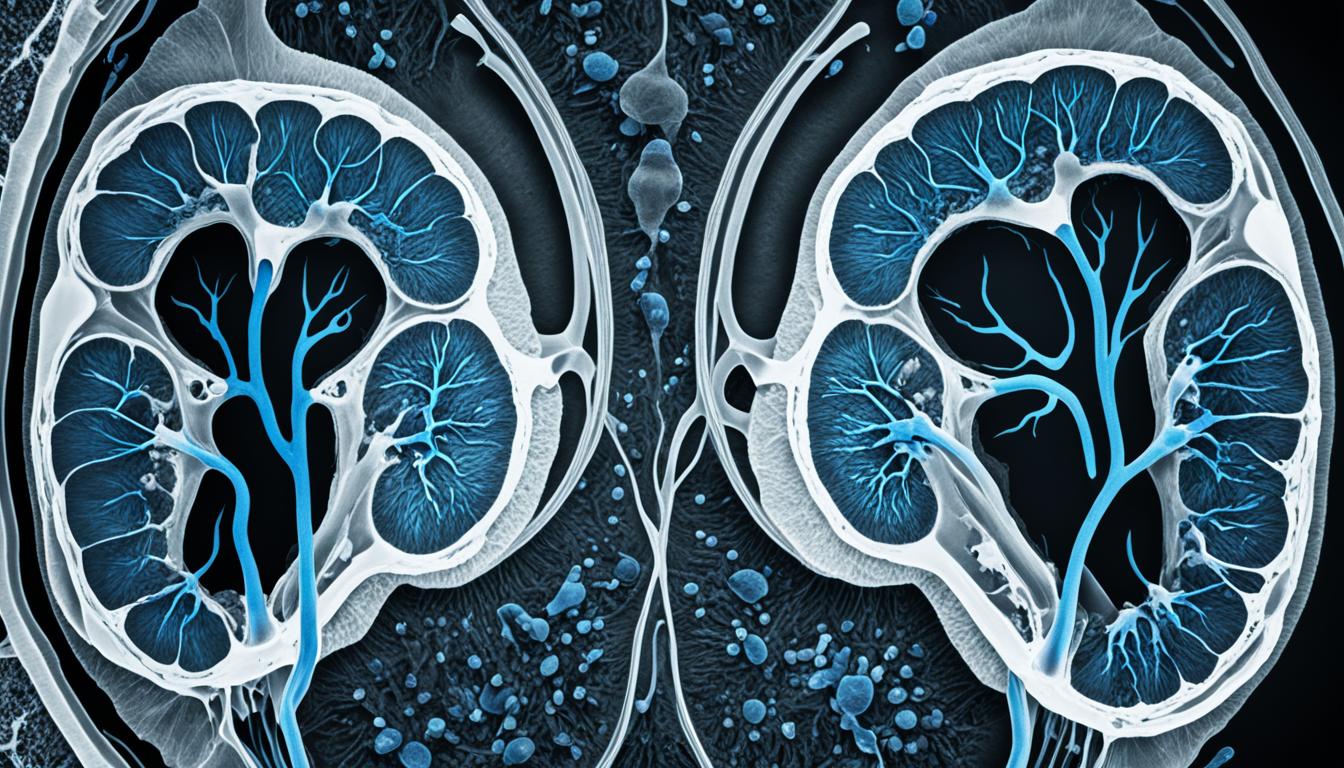Chronic kidney failure is a heavy condition. It hinders the kidneys’ job over time. This leads to waste and extra fluid build-up in our bodies.
The signs of chronic kidney failure are very noticeable. People feel tired, gain fluid, pee less, have high blood pressure, and become anemic. The causes vary, often linked to diseases like diabetes and high blood pressure.
Doctors diagnose this by doing blood and urine checks, along with special pictures of your insides. A kidney biopsy might also be needed. Recent studies show that stem cell therapy could be a new hope for treating this condition.
Key Takeaways:
- Chronic kidney failure affects the way kidneys function, causing waste and fluid build-up.
- Its signs include tiredness, fluid gain, less peeing, high blood pressure, and anemia.
- Diseases like diabetes and high blood pressure often lead to this condition.
- Diagnosis needs various tests including blood work, pee tests, and imaging.
- Stem cell therapy has shown promising effects in easing chronic kidney failure.
Warning Signs and Symptoms of Chronic Kidney Failure
The early signs of chronic kidney failure can be hard to notice. They might be things like feeling tired, not being able to focus, or not wanting to eat. You could also get muscle cramps.
As it gets worse, signs become clearer. You may hold onto too much fluid, have swollen legs and feet, or need to pee a lot. Your urine could change in color and how often you go.
If kidney failure is serious, you might feel sick to your stomach, be itchy, or have trouble breathing. These are signs to get help right away.
Causes and Risk Factors of Chronic Kidney Failure
Chronic kidney failure is a serious health issue. Also called chronic kidney disease (CKD) or end-stage renal disease (ESRD), it happens due to many factors. It’s key to know these causes and risks. This helps people take steps to avoid the disease.
Causes of Chronic Kidney Failure
Many things can lead to chronic kidney failure:
- Diabetes: High blood sugar from diabetes can hurt kidneys over time.
- High blood pressure: Persistent high blood pressure can damage the kidneys.
- Glomerulonephritis: Inflammation in the kidneys’ filters can cause damage.
- Polycystic kidney disease: A genetic condition where cysts harm the kidneys.
- Recurrent kidney infections: Frequent infections can lead to kidney damage.
- Autoimmune diseases: Diseases like lupus can inflame and hurt kidneys.
- Urinary tract obstructions: Blockages by stones or tumors can harm the kidneys.
- Certain medications: Some drugs, like NSAIDs, if used a lot, can hurt the kidneys.
Risk Factors for Chronic Kidney Failure
Many risk factors can make chronic kidney failure more likely:
- Family history: If kidney disease runs in the family, you might be more at risk.
- Advanced age: The chance of developing this disease goes up as you get older.
- Obesity: Being overweight can lead to problems like diabetes and high blood pressure, which can hurt the kidneys.
- Smoking: Smoking can harm your blood vessels and up the chances of kidney disease.
Knowing what causes and risks are involved can lead to better lifestyle choices. It can also encourage seeking medical help when needed. These steps help to lower your risk of chronic kidney failure and keep your kidneys healthy.
Stem Cell Therapy for Chronic Kidney Failure
Stem cell therapy presents a new path in treating chronic kidney failure. It uses the power of versatile stem cells. These cells can become various cell types, including kidney cells. This method helps in repairing damaged kidney tissue, enhancing function, and easing symptoms of the disease.
The sources of stem cells vary. They can come from umbilical cord blood, bone marrow, or fat tissue. Treatment includes putting the stem cells directly into the affected kidneys or into the blood. This way, they can find their way to the kidneys. Although we still need more studies to completely understand how this therapy works, initial results from tests are very encouraging.
Healthcare providers see a lot of potential in stem cell therapy. They hope it can lead to better care for people with chronic kidney failure. As we learn more and make progress, stem cell therapy could significantly change how we deal with kidney diseases. It brings new hope and the chance for better outcomes for those affected.

